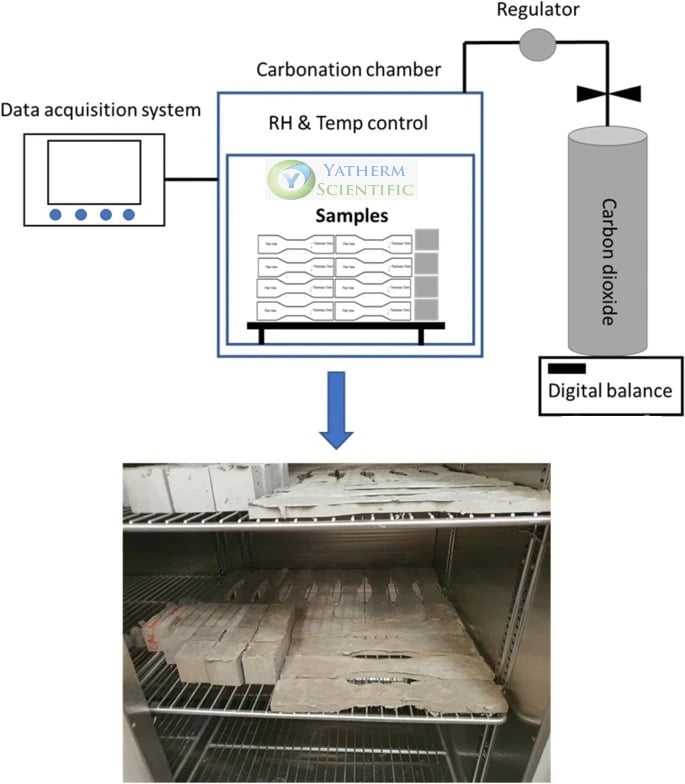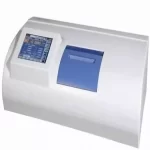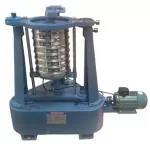CARBONATION CHAMBER
Carbonation Chambers Are Ideal for Testing the Durability of Various Building Materials
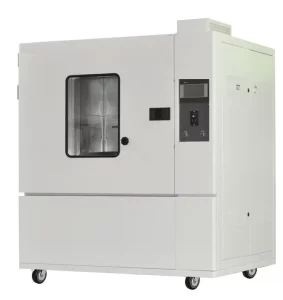
The carbonation Chambers is primarily designed to determine the temperature and humidity conditions required to protect the precious samples. This activity is done under a certain concentration (that may vary from 20% to less) of carbon dioxide gas (CO2) in a concrete specimen carbonation depth.
Our proven and high-quality chamber solutions provide matchless sample protection for an extensive range of sample types and even a wide array of large-sized storage conditions.
What is Carbonation?
Carbonation is a long process in concrete and refers to the reaction between Co2 in the surrounding environment & hydrated cement minerals present in the material. This interaction process leads to a reduction in alkalinity and potential reinforcement rust, which affects the durability of the Concrete structure.
What is the Carbonation Test for Concrete?
The carbonation test is an internationally accepted method for calculating the concrete’s resistance behavior to carbonic acid penetration. This is the standard process that helps the engineer in the assessment of the effect of carbonation on concrete structures. It enables engineers to make decisions regarding preventive maintenance and regular repair.
What is the Process of Carbonation?
The process of the carbonation test involves the diffusion of Co2 through the micro concrete pores, which is generally followed by its reaction with Ca(OH)2 (Calcium Hydroxide), leading to the formation of CaCO₃ (Calcium Carbonate). This damages the natural protective disabling layer on the augmentation and escalates the risk of corrosion, which can significantly compromise the structural integrity.
CO2 exposure
The standard procedure of performing the pre-curing every three months in a temperature-controlled humid chamber. Testing samples are placed in human controlled environment of a carbonation test chamber to identify the effects of the carbonation process on different mixtures. The concentration of carbon dioxide can be maintained from 1 % to 5% with a temperature range of 20°C to 27 °C. Relative humidity must be selected based on the environment so we chose 60 to 70% as it was close to the water body. Several cracks on each sample are visible after 3-month RH curing + 3-month Carbonation.
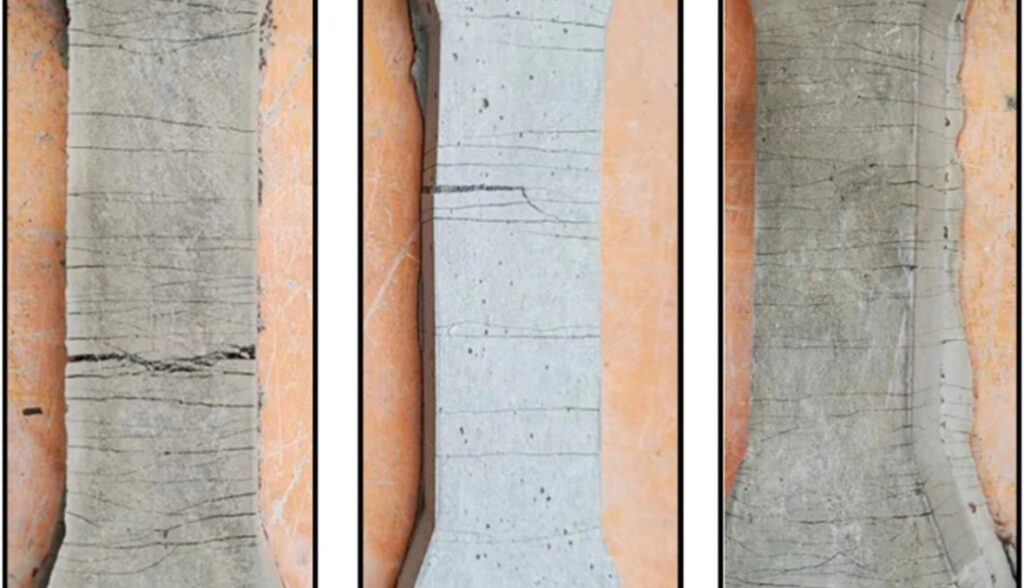
Materials Used in the Making of Carbonation Chambers
The sandwich-type construction is used in the carbonation chamber where 304 stainless steel plates are used in the construction of the inner side, while the outer area is created with the help of the powder-coated mild steel plate. In general, the dimension of the internal chamber is 600 mm X 600mm X600mm; optimum performance with 150 kg of Concrete load; and volume is 200 liter.
Humidity varies from 40% to 80% RH and temperature goes from 20 degrees Celsius to 60 degrees Celsius. The CO2 concentration goes from 0 to 5%. The control panel manages all the above-mentioned parameters automatically. The front door opening makes the chamber airtight.
Air Circulation
The chamber contains a blower that manages the temperature throughout the area by a quiet running blower circulation air. The uniform temperature and humidity are obtained through the forced air circulated in a vertical direction and re-circulated throughout the chamber.
Humidity
The steam injection method is used to create the humidity in the Carbonation Test Chamber. The backside of the chamber also includes a boiler tank that helps the product for better servicing. The boiler tank also contains a float valve that assists the equipment in controlling the water level.
Heating & Cooling System
The chamber includes durable SS tubular heaters as the heating element. Our accelerated carbonation vacuum chamber comes with stainless steel fins that are known for transferring heat in the optimum possible way. It also comprises the hermetically sealed compressor CFC-free compressor along with a long-lasting condenser and evaporation coil.
Co2 System
Yatherm offers 0-20% range CO2 gas with Pressurized Co2 cylinders & regulators operated directly from PLC with NDIR sensors. Infra-red sensors help in maintaining the Co2 Gas inside the closed chamber with a high recovery rate. PLC is designed to operate on Four programs with 5% Co2 Range, 10% Co2 Range, 15 % Co2 Range & 20% Co2 range.
Salient Features:
- Double-wall construction
- The Interior is fabricated from high-grade stainless steel.
- The exterior body is made of Mild and duly powder-coated steel material.
- User-friendly designed chamber door and locking mechanism
- Incorporated with a Digital controller and quality Imported Temp, RH & CO2 Sensors
- Uniformity is sustained by a quiet running blower.
- The humidity created by the steam injection method
- CO2 Indicator with imported CO2 Sensor
- Aesthetic outer look and electrical wiring as per CE Compliances
- Removable perforated trays to provide enhanced air circulation through samples
- Carbonation chambers offer precise control over temperature, humidity, carbon dioxide concentration, and airflow, replicating real-world conditions.
Safety Features
- High-temperature safety cut-off
- Electrical overload cut off
- Low water level boiler cut off
- Electrical circuit breaker
- Time delay for compressor switch ON
Carbonation Chamber Technical Specification
| Construction | Sandwich type |
| Inner chamber | Stainless steel S.S. – 304 Grade |
| Exterior body | Mild steel |
| CO2 Concentration Tolerance: ±1% | Power Supply: AC 220V, 50/60Hz, 1 Ph |
| Paint | Powder coating in attractive shades |
| CO2 Sensor: Imported Photoelectric Sensor | Cooling Rate: 0.7 ~ 1℃/min |
| Temp Sensor: Dual Platinum Resistance PT100Ω/MV | Heating Speed: 3℃ ~ 5℃/min |
| Temperature range | 5°C above Ambient to 60°C. |
| Optimum Performance | with 150 kg of Concrete load |
| CO2 Concentration | Atmosphere concentration to 4.5% with accuracy 0.01% (Maximum solubility of CO2 in water is 4%) |
| Humidity range | Ambient to 80% RH (Maximum carbonation takes place between 40% RH to 80% RH ) |
| Controller | Digital PID Temp & RH Controller |
Dimension Matrix
| Model Number | Internal Dimension
(W X D X H)(cm) |
Capacity
Liters |
| Carbon 100 | 45 x 45 x 50 | 100 |
| Carbon 200 | 50 x 50 x 80 | 200 |
| Carbon 300 | 55 x 55 x 100 | 300 |
| Carbon 400 | 60 x 60 x 110 | 400 |
| Carbon 500 | 60 x 60 x 140 | 500 |
| Carbon 600 | 70 x 60 x 145 | 600 |
| Carbon 700 | 70 x 70 x 145 | 700 |
| Carbon 800 | 75 x 75 x 145 | 800 |
| Carbon 900 | 80 x 75 x 150 | 900 |
| Carbon 1000 | 80 x 80 x 155 | 1000 |
Application
The carbonation chamber is perfect for determining the life of concrete/building materials under a constant temperature, CO2 concentration, and humidity. Yatherm Scientific manufactures and provides high-quality yet reasonably-priced digital carbonation chambers (CARBONATION CHAMBERS). Our concrete testing chambers come with optimum possible accuracy while following the WHO standards and complying with FDA 21 CFR part 11 standards. They can be a perfect choice for the demanding needs of daily lab applications.